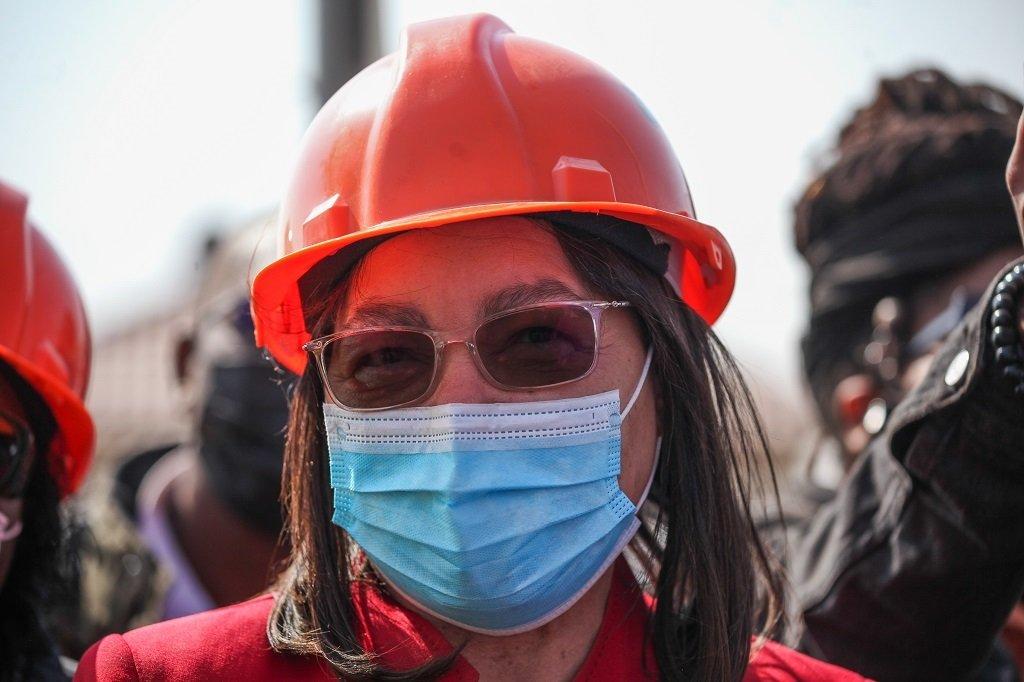Africa-Press – South-Africa. State capacity to deliver infrastructure projects will be bolstered with the support of the UK government – this after the UK and South African governments extended a Memorandum of Understanding (MoU) to support the latter’s National Infrastructure Programme 2050.
Government has, in recent years, faced mounting pressure over public infrastructure delivery.
UK Minister for Exports and Minister for Equalities, Mike Freer, and South Africa’s Minister of Public Works and Infrastructure, Patricia de Lille, signed the MoU at the British High Commissioner’s residence in Bishopscourt, Cape Town, on Monday.
The UK Infrastructure and Projects Authority (IPA), a body which conceptualises projects and then sees them through to execution, and Infrastructure South Africa (ISA) – a programme within the Department of Public Works and Infrastructure (DPWI) that supports the planning, management, and delivery of projects – are both involved in the partnership.
The UK will support South Africa’s infrastructure plans by sharing technical knowledge, advice, skills and expertise.
This is a continuation of a previous MoU signed in 2020, in which South Africa adopted the UK’s 5 Case Model and Project Development Route Map training programme, which are globally recognised as best practices.
Budget 2022| Road ahead: Godongwana touts plans to rollout of infrastructure
Dr Kgosientso Ramokgopa, head of ISA, explained government realised the issue with rolling out infrastructure was a lack of “financial and technical engineering capacity” to prepare and package them in a way that they can raise funding through debt capital markets.
He recalled how a South African delegation visited the UK’s IPA and was exposed to the 5 Case Model and its robustness in packaging projects so that they could attract funding.
One of the requests made for the MoU was for South African officials to have training on the 5 Case Model. ISA staff were among those first trained, and so far over 150 officials across all spheres of South African government, including state-owned enterprises, have been trained.
Ramokgopa explained that if a project has “survived the test” of the 5 case Model, it means its prospects of being funded though the debt capital markets is elevated. This is because development finance institutions and multllateral banks are familiar with it.
The extended MoU will benefit 150 more government officials and entities – this includes municipalities, public entities and state-owned enterprises that are “critical” in infrastructure delivery, a joint statement from the parties read.
In her remarks, De Lille noted that South Africa “borrowed a lot” of ideas from the UK and even used the UK’s methodologies to narrow down a pipeline of projects from 276 to 62 that were bankable and could be taken to market.
“The 5 case model has helped us a great deal,” De Lille said. In the next few months, her department is planning to incorporate it into the Infrastructure Development Act, so that it can become law.
James Ballingall, head of the UK’s IPA, reiterated that the work through the MoU is to help South Africa put in place frameworks to attract international investment. The 5 Case Model is one that has been recognised to comply with G20 best practices, he explained.
Knowing that a project tests well against the 5 Case Model gives potential investors confidence in projects. The UK has worked with other countries such as Indonesia, Columbia, Brazil, and Peru to share the 5 Case Model.
SA’s development goals delayed, but not because of money. Infrastructure chief explains why
British High Commissioner to South Africa, Antony Phillipson, explained that the state’s role is to develop frameworks needed to give people the confidence to invest, especially in long-term projects. He sees the MoU as “great step forward” in the UK’s partnership with South Africa.
He believes the MoU will bring significant benefits to the infrastructure sector and allow UK and South African businesses to work together. “Through our collaborative efforts in research and innovation, we look forward to working with the South African government to deliver sustainable infrastructure that will promote growth and job creation,” said Phillipson.
Infrastructure is not the only area where the two countries are partnering. The UK is one of the international partners – alongside the US, EU, Germany and France – that have committed to mobilise $8.5 billion to assist South Africa’s transition to a low carbon economy. The state has a “crucial role” to make commitments to create frameworks for the private sector and the public sector to step into, he added.
Freer, who is on a three-day visit to South Africa to strengthen the bilateral partnership between the countries, explained that such partnerships are needed for legacy building. UK businesses should not just build infrastructure and then leave without imparting knowledge and skills, he explained. The MoU shows the UK’s commitment to support the development and delivery of South Africa’s National Infrastructure Plan 2050, he said ahead of the MoU signing ceremony.
“It is an important step towards building closer economic ties and sharing skills and expertise that will encourage opportunities for trade and investment to help support South Africa’s recovery from the pandemic and deliver shared prosperity,” he added.
He also stressed the importance of social infrastructure, such as public transport, either on road or rail, to allow people to participate in the economy and then empower themselves financially.
Freer will also attend the African Mining Indaba, currently under way in Cape Town. He plans to meet with government and business to discuss commercial opportunities in sectors such as infrastructure, mining and renewable energy.
Freer will also meet Trade, Industry and Competition Minister Ebrahim Patel to discuss existing trade and identify further opportunities.
For More News And Analysis About South-Africa Follow Africa-Press






